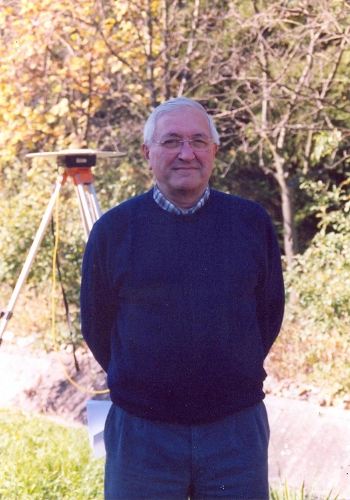 István Fejes (Photo courtesy of Sandor Frey)
István Fejes (Photo courtesy of Sandor Frey)
István Fejes
Contributed by Sandor Frey
István Fejes graduated in mathematics and physics at the Loránd Eötvös University of Sciences (Budapest, Hungary) in 1965. He earned his scientific degrees (PhD and DSc) in radio astronomy topics (The distribution of the interstellar neutral hydrogen in the Virgo region; Observations of SS433 with VLBI). For three decades he worked at the Institute of Geodesy, Cartography and Remote Sensing, Satellite Geodetic Observatory (SGO), and he was the head of the observatory from 1990 until his retirement in 2003.
István joined the SGO at the time of its foundation in 1973. During his professional career he made significant contributions to a broad range of disciplines. As a radio astronomer, he established a successful research group working on the astrophysical and geodetic applications of Very Long Baseline Interferometry (VLBI) and he also contributed to the development of the Space VLBI technique. Concerning the microwave satellite positioning techniques, in the mid-eighties he worked on the Doppler interferometry technology, a precursor to the present-day Global Navigation Satellite Systems (GNSS) analysis approach. He became the head of the observatory in 1990, a difficult but exciting period in Hungary's recent history.
Relying on the existing broad international collaborations, he was one of the initiators of the biennial "GPS in Central Europe" seminar series that connected researchers in Western and Eastern Europe. He played a key role in adopting the GPS technique in Hungary, for which he was honored by the Academic Prize of the Hungarian Academy of Sciences in 1993. He was one of the initiators of the establishment of the Hungarian GPS Geodynamic Reference Network in the late 1980s. He was also one of the founders of the Central European GPS Geodynamic Reference Network in 1994. Both programs are still running successfully. Later his interest changed slightly from the most precise GPS applications to the real-time GNSS positioning services. He joined the first European Position Determination System (EUPOS) initiative and contributed to the activities of the EUPOS ISC (International Steering Committee).
István placed special emphasis on international scientific collaboration. He himself also a spent long time in foreign research institutions, mainly in The Netherlands and Germany. As a university lecturer and PhD supervisor, he was engaged with educating the younger generation. The scientific topics he advocated still form the backbone of the research structure at the SGO.
He was a member of the Hungarian Space Research Council, several bodies of the Hungarian Academy of Sciences, the Committee on Radio Astronomy Frequencies (CRAF), the International Astronomical Union (IAU), the International Association of Geodesy (IAG), and the International Union of Radio Science (URSI).
István Fejes died on 11 June 2011.
Modified on Tuesday, 09-Aug-2011 09:52:33 EDT by Ellen Bouton, Archivist (Questions or feedback)
|
![[IAU logo]](iau_wb_thumb.jpg)
![[URSI logo]](URSI-logo-thumb.jpg)
![[Karl Jansky at his antenna]](jansky_photo_02_thumb.jpg)
![[Reber's Wheaton antenna]](Reber_Telescope_Wheaton_thumb.jpg)
![[Dover Heights]](Dover_Heights_02_thumb.jpg)
![[4C telescope]](GB61-195_4C_telescope_thumb.jpg)
![[Ewen and horn antenna]](ewen_horn1s.jpg)
![[Dwingeloo, 1956]](Dwingeloo-1956-thumb.jpg)
![[Jocelyn Bell Burnell and Cambridge antenna used in pulsar discovery]](burnell2_thumb.jpg)
![[Lovell Telescope at Jodrell Bank]](site_1594_0001-500-334-20180316163019-thumb150.jpg)
![[Wilson, Penzias, and Bell Labs horn antenna]](wilson-penzias-horn_thumb.jpg)
![[6-m Millimeter Radio Telescope in Mitaka, Japan]](6m-thumb.jpg)

